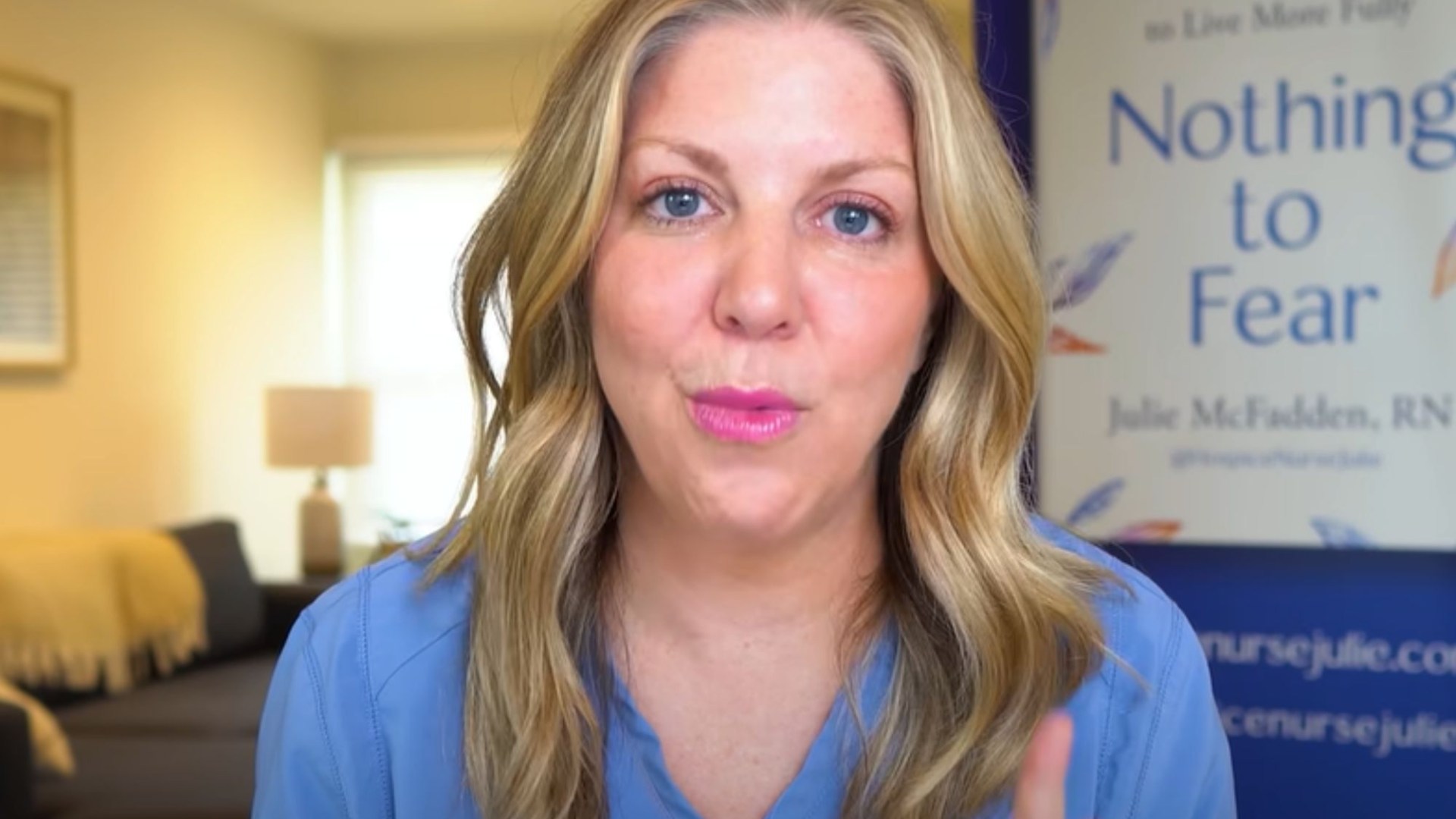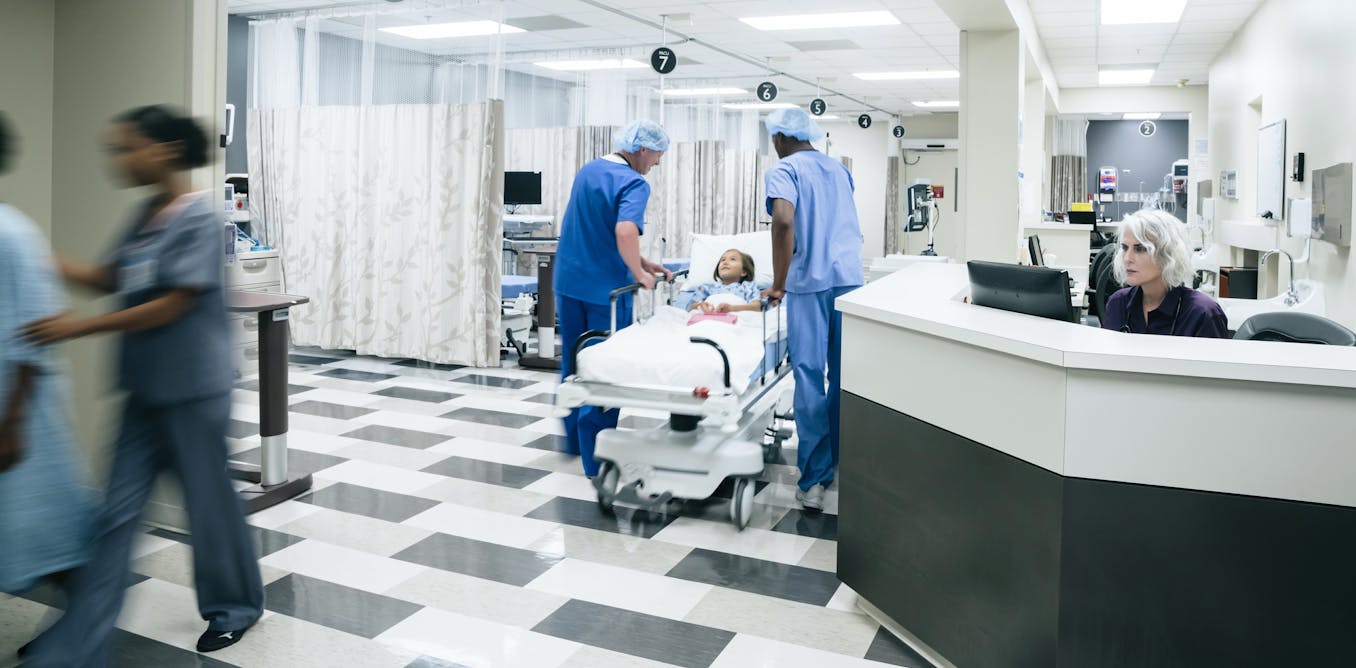AN end-of-life nurse has revealed some of the most surprising things about death which she found “mindblowing” when she first started her career.
Hospice nurse, Julie McFadden has seen witnessed all and is now sharing her insights to help teach people more about death and the dying process.
2

2
Sharing her thoughts on YouTube, the 41-year-old nurse is trying to make people “less scared” of dying.
“There are a lot of unknowns about the end of our lives which I think can make people more afraid,” Julie said.
“But the more I’ve been around people at the end of their life the less I am afraid because I’ve seen with my own eyes the way our body helps us prepare for that.
“And the different things that are comforting to us that happen to us as we die.”
THEY CAN HEAR US
Julie has revealed three fascinating facts about death which she found most shocking when she first became an end-of-life nurse.
The first thing about death that astonished her was that people on the brink of passing away can still hear – even when it seems like they can’t.
This is sometimes known as the breaking down unconsciousness walls.
“There have been studies done on people who were dying which showed the hearing sensor in the brain was the last bit to shut down,” the nurse explained.
This should bring relief to people who can rest assured knowing what they say to their loved one in their final moments is being heard – even if they are unconscious.
On the flip side, Julie said people should make sure they are “respectful” of their loved ones when in the same room.
“Please don’t argue, or don’t talk about them like they aren’t there because we do believe they can hear you,” she said.
“As a hospice nurse, I always try to speak to the people who are unconscious like they could answer me back,” she added.
Julie, who previously worked as an ICU nurse, added that she witnessed many people who came out of comas who told her that they “could sense” what was going on while they were asleep.
“They could hear certain things and could sense people in the room they knew somewhat what was going on,” she said.
“And we do think this is the same for the dying person.”
UNIMAGINABLE PHENOMENA
Julie described the second one of these as the ‘deathbed phenomenon’.
The term is used to describe a series of experiences that occur to someone moments before they pass away.
“I know I talk about this all the time but this is mindblowing,” she said.
This phenomenon includes something called ‘deathbed visioning’.
These end-of-life visions are different to hallucinations caused by psychosis or delirium.
They usually involve people who see loved ones who have already passed.
She also mentioned ‘terminal lucidity’, but what you might know as ‘the rally or the surge’.
This happens when someone who looks very ill will suddenly get a burst of energy and look like they’re getting ‘better’,
Some think a burst of cortisol or other hormones might make people “perk up” in their final days, but Julie said we don’t know why this happens.
While she described the phenomena as “shocking” and “unbelievable”, she also said it was “comforting.”
“Hence why I always educate about it,”she continued.
“I feel like it’s important for me as a hospice nurse to educate the general public that these are things that actually happen. We don’t know why but they do.”
DEHYDRATION
Perhaps most shockingly, Julie said being dehydrated can help someone die a more peaceful death.
“This is because a dying body cannot handle the hydration a living body can,” she said.
She added: “So if we try to hydrate a dying body at the end of life they will become overloaded with fluid.
“The fluid will not stay in the veins but seep out and cause swelling, and eventually respiratory distress.”
When it’s time, the body will help us die by keeping us dehydrated.
“The more dehydrated you are the better you will feel,” she said.
“You’re going to go into ketosis and your body will release endorphins that will give you a euphoric pain which will dull the pain.”
The end-of-life nurse has previously revealed the ‘worst’ diseases to die from – and the most peaceful ways to go
Exactly how it feels as you die
YOU wouldn’t be alone in pondering what it feels like when you die.
Death is something we will all experience some day, but for many of us it feels like the great unknown.
Now a doctor has shared what exactly happens to your body as you edge slowly towards death.
1. Your heart slows
Firstly, your heart will begin to beat more slowly – in turn, your blood will be pumped around your body more slowly and your blood pressure will fall, palliative medicine specialist Dr Kathryn Mannix wrote in Science Focus.
2. Your breathing changes
Your breathing will follow automatic patterns generated by the respiratory centre in the brain stem, Dr Kathryn wrote.
It could get heavier and noisier – some people lose the sense of their mouth and throat. But this happens without apparent distress, the doctor said.
You may also start to breath more slowly and shallowly.
Your breath could move from deep to shallow and from fast to slow in repeating cycles.
There might be pauses and, eventually, it will come to a halt. Your heart will stop after a few minutes, as it is no longer being supplied with oxygen.
3. Dipping in and out of consciousness
You’ll spend progressively less time awake, Dr Kathryn said.
It might look like sleep from the outside, but you’ll gradually drift into consciousness for longer periods of time as you near the end, maybe without noticing it.
Dr Kathryn wrote: “On waking, people report having slept peacefully, with no sense of having been unconscious.”
Research published earlier this year indicates that you could even enter a meditative state.
Scientists accidentally captured our most complex organ as it shut down, showing an astonishing snapshot into death.
A patient with epilepsy was hooked up to an electroencephalogram (EEG) before having a heart attack.
This meant the 15 minutes around his death was recorded on the EEG.
In the 30 seconds either side of the patient’s final heartbeat, an increase in very specific brain waves were spotted.
These waves, known as gamma oscillations, are linked to things like memory retrieval, meditation and dreaming.
This could mean – although many more studies would need to take place – we might see a sort of film reel of our best memories as we die.
The parts of the brain that were activated in this study also suggests we could enter a peaceful dreamlike state that feels similar to meditation.
4. You might respond to sound
Researchers think you might still be able to hear sounds in your final moments, despite seeming unresponsive.
Looking at brain activity in coma patients in 2019, they predicted that some form of awareness could be possible at the end.
While you might be able to hear, you may not necessarily be able to make sense of what is going on.
But Dr Kathryn said: “We have no proven way to investigate what people experience during dying.
“Recent research shows that, even close to death, the unconscious brain responds to noises in the room. We don’t know how much sense music or voices make to a dying person, however.”




